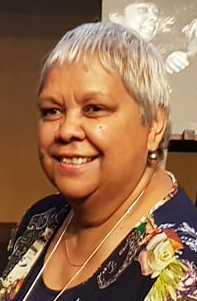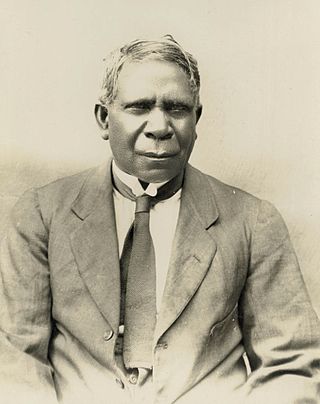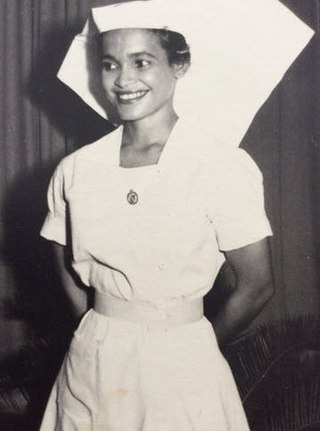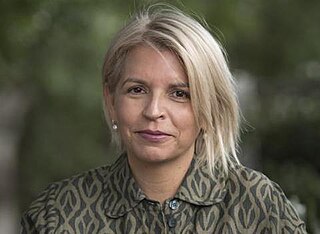Related Research Articles

Lowitja O'Donoghue, also known as Lois O'Donoghue and Lois Smart, was an Australian public administrator and Indigenous rights advocate. She was the inaugural chairperson of the Aboriginal and Torres Strait Islander Commission (ATSIC) from 1990 to 1996. She is known for her work in improving the health and welfare of Indigenous Australians, and also for the part she played in the drafting of the Native Title Act 1993, which established native title in Australia.
Reconciliation Australia is a non-government, not-for-profit foundation established in January 2001 to promote a continuing national focus for reconciliation between Indigenous and non-Indigenous Australians. It was established by the Council for Aboriginal Reconciliation, which was established to create a framework for furthering a government policy of reconciliation in Australia.

Marcia Lynne Langton is an Aboriginal Australian writer and academic. As of 2022 she is the Redmond Barry Distinguished Professor at the Melbourne School of Population and Global Health, University of Melbourne. Langton is known for her activism in the Indigenous rights arena.
Indigenous Australian self-determination, also known as Aboriginal Australian self-determination, is the power relating to self-governance by Aboriginal and Torres Strait Islander peoples in Australia. It is the right of Aboriginal and Torres Strait Islander peoples to determine their own political status and pursue their own economic, social and cultural interests. Self-determination asserts that Aboriginal and Torres Strait Islander peoples should direct and implement Aboriginal and Torres Strait Islander policy formulation and provision of services. Self-determination encompasses both Aboriginal land rights and self-governance, and may also be supported by a treaty between a government and an Indigenous group in Australia.
Indigenous Australians are people with familial heritage from, and/or recognised membership of, the various ethnic groups living within the territory of present day Australia prior to British colonisation. They consist of two distinct groups, which includes many ethnic groups: the Aboriginal Australians of the mainland and many islands, including Tasmania, and the Torres Strait Islanders of the seas between Queensland and Papua New Guinea, located in Melanesia. The term Aboriginal and Torres Strait Islander peoples or the person's specific cultural group, is often preferred, though the terms First Nations of Australia, First Peoples of Australia and First Australians are also increasingly common; 812,728 people self-identified as being of Aboriginal and/or Torres Strait Islander origin in the 2021 Australian Census, representing 3.2% of the total population of Australia. Of these Indigenous Australians, 91.4% identified as Aboriginal; 4.2% identified as Torres Strait Islander; while 4.4% identified with both groups. Since 1995, the Australian Aboriginal flag and the Torres Strait Islander flag have been official flags of Australia.

Henrietta Marrie is a Gimuy Walubara Yidinji elder, an Australian Research Council Fellow and Honorary Professor with the University of Queensland.

Jacqueline Gail "Jackie" Huggins is an Aboriginal Australian author, historian, academic and advocate for the rights of Indigenous Australians. She is a Bidjara/Pitjara, Birri Gubba and Juru woman from Queensland.

The National Congress of Australia's First Peoples was the national representative body for Aboriginal and Torres Strait Islander Australians from 2009 to 2019.
Indigenous Australians are both convicted of crimes and imprisoned at a disproportionately higher rate in Australia, as well as being over-represented as victims of crime. As of September 2019, Aboriginal and Torres Strait Islander prisoners represented 28% of the total adult prisoner population, while accounting for 2% of the general adult population. Various explanations have been given for this over-representation, both historical and more recent. Federal and state governments and Indigenous groups have responded with various analyses, programs and measures.

Indigenous health in Australia examines health and wellbeing indicators of Indigenous Australians compared with the rest of the population. Statistics indicate that Aboriginal Australians and Torres Strait Islanders are much less healthy than other Australians. Various government strategies have been put into place to try to remediate the problem; there has been some improvement in several areas, but statistics between Indigenous Australians and the rest of the Australian population still show unacceptable levels of difference.

Thomas Edwin Calma,, is an Aboriginal Australian human rights and social justice campaigner, and 2023 senior Australian of the Year. He was the sixth chancellor of the University of Canberra (2014-2023), after two years as deputy chancellor. Calma was the second Aboriginal or Torres Strait Islander person to hold the position of chancellor of any Australian university.

Mick Gooda is an Aboriginal Australian public servant. He has particularly served as the Aboriginal and Torres Strait Islander Social Justice Commissioner of the Australian Human Rights Commission from 2009 to 2016 and as Co-Commissioner of the Royal Commission into the Protection and Detention of Children in the Northern Territory from 2016 to 2017. He is a descendant of the Gangulu people of Central Queensland.
The Closing the Gap framework is a strategy by the Commonwealth and state and territory governments of Australia that aims to reduce disparity between Aboriginal and Torres Strait Islander peoples and non-Indigenous Australians on key health, education and economic opportunity targets. The strategy was launched in 2008 in response to the Close the Gap social justice movement, and revised in 2020 with additional targets and a refreshed strategy.

Indigenous Australian literature is the fiction, plays, poems, essays and other works authored by Aboriginal and Torres Strait Islander people of Australia.
Cindy Anne-Maree Shannon is an Australian academic best known for her work in the field of Indigenous health.

MaryAnn Bin-Sallik is a Djaru Elder and Australian academic, specialising in Indigenous studies and culture. She was the first Indigenous Australian to gain a doctorate from Harvard University.
Kirstie Parker is a Yuwallarai journalist, policy administrator and Aboriginal Australian activist. From 2013 to 2015 she served as the co-chair of the National Congress of Australia's First Peoples and during her tenure pressed for policies that allowed Aboriginal and Torres Strait Islander Australians to gain the ability for self-determination.
Vanessa Lee-AhMat is an Australian scholar who was the first Aboriginal and Torres Strait Islander PhD graduate from Griffith University School of Medicine. In 2005, Lee-AhMat was recognised by the Parliament of Australia for her dedication and commitment to Thursday Island community, in the Torres Strait.

Hannah McGlade CF is an Australian academic, human rights advocate and lawyer. She is a Kurin Minang Noongar woman of the Bibulman nation and is as of May 2022 an associate professor at Curtin University's law school. She was appointed Senior Indigenous Fellow at the Office of the United Nations High Commissioner for Human Rights in 2016 and has been a member of the United Nations Permanent Forum on Indigenous Issues since 2020.
Vonda Lisa Malone is the Chief executive officer of the Torres Strait Regional Authority since the 1 May 2022 and is on the NIAA Senior Advisory Group, and is a member of the Queensland Government Truth-telling and Healing Inquiry. Vonda was the first female Mayor of the Torres Shire Council.
References
- 1 2 "Sandra Creamer". The Conversation. Retrieved 10 May 2022.
- 1 2 3 "Q&A with Sandra Creamer". The University of Queensland. Retrieved 10 May 2022.
- 1 2 "Family is everything". The University of Queensland. Retrieved 10 May 2022.
- ↑ "Domestic violence survivor, Indigenous rights activist and grandmother Sandra Creamer makes history after admission to legal profession". ABC News. 28 July 2020. Retrieved 10 May 2022.
- ↑ "APPLICATION FORM IN WORD FORMAT Special Rapporteur on the rights of indigenous peoples". United Nations Human Rights Office. Archived from the original on 2 July 2021. Retrieved 10 May 2022.
- 1 2 "The Global Board of Directors". IPRI. Archived from the original on 10 August 2022. Retrieved 10 May 2022.
- 1 2 "Our Aboriginal and Torres Strait Islander Advisory Group". Queensland Human Rights Commission. Archived from the original on 8 March 2022. Retrieved 10 May 2022.
- ↑ "Institute for the Study of Human Rights". Columbia University ISHR. Retrieved 10 May 2022.
- 1 2 "CQUni academic a delegate at UN gathering in New York". Central Queensland University. Retrieved 10 May 2022.
- ↑ "UQ Researchers". The University of Queensland. Retrieved 10 May 2022.
- ↑ "Staff". NATSIWA. Retrieved 10 May 2022.
- ↑ "Advisory body to help shape a future free from violence against women". Ministers for the Department of Social Services. Retrieved 10 May 2022.
- ↑ "Launching of the Indigenous Peoples Rights International-IPRI" (PDF). University of New South Wales. Retrieved 10 May 2022.
- ↑ "Our Leadership". Seventh Generations Fund for Indigenous Peoples, Inc. Retrieved 10 May 2022.
- ↑ "STOP Domestic Violence Conference 2020". Industry Events. Retrieved 10 May 2022.
- ↑ "Our curated collection of speakers". ANROWSConf2022. Retrieved 10 May 2022.
- ↑ "2019 Queen's Birthday Honours List". The Governor-General of the Commonwealth of Australia. Retrieved 10 May 2022.
- ↑ "Deakin congratulates 2019 Queen's Birthday honours recipients". Deakin University. Retrieved 10 May 2022.